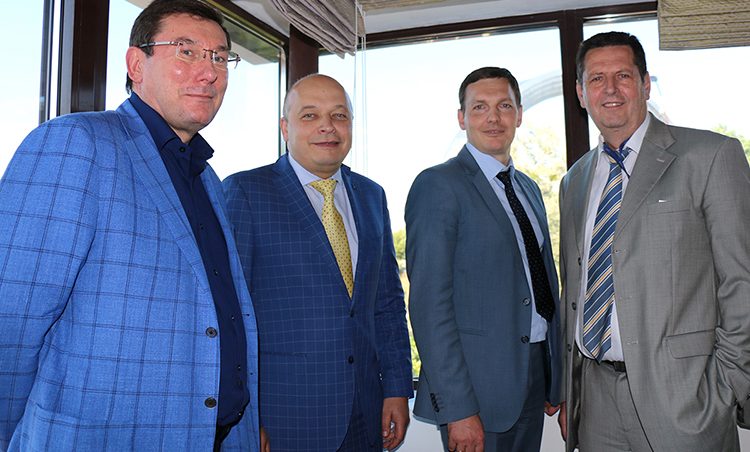General Prosecutor and EU leaders agree way ahead for prosecution reform at EUAM headquarters
July 03, 2017
General Prosecutor of Ukraine Yurii Lutsenko, EUAM Head of Mission Kestutis Lančinskas, Deputy Prosecutor General Yevhenii Yenin, EUAM Head of Operations Udo Möller
During comprehensive discussions held last Friday evening, the General Prosecutor of Ukraine, Yuri Lutsenko, assured the Head of the Delegation of the European Union to Ukraine, Hugues Mingarelli, and the Head of the EU Advisory Mission (EUAM), Kestutis Lančinskas, that much-needed reform of Ukraine’s prosecution system would continue, in close cooperation with EUAM.
Ambassador Mingarelli remarked: “We had a constructive discussion on the state of play of the reform of the prosecution system. On our side we noted that the three main priorities for the ongoing reform process should be the renewal of the prosecution system, the reduction of competences of the PGO and their transfer to the State Bureau of Investigation according to the timeline set by the law, and the increase of independence and autonomy of the prosecution system, including through the reinforcement of its self-governing bodies”.
“I think that we now have a clearer vision for the way ahead,” said Mr Lutsenko. “We have agreed that at our next meeting, we will conclude a roadmap for reform with EUAM support, and what steps need to be taken.”
Looking ahead, all parties agreed that the support of the international community would be critical. In this context, enhanced communication between EUAM and the prosecutor’s office would make the path to reform smoother. Mr Lančinskas and Mr Mingarelli complimented Mr Lutsenko for achievements made, such as the introduction of a pay-bonus system for prosecutors, the introduction of an integrity-checks regulation, and the impending introduction of a performance evaluation system. In order to build on that, they noted that the launch later this year of an EU Rule of Law project (PRAVO) might represent an opportunity for the GPO to accelerate prosecutorial reforms.
For its part, the EU – through EUAM, and the Justice Reform Support project – has provided support to prosecution reform in several areas. EUAM has observed the selection of local prosecutors, launched the pilot ‘merger’ project to improve cooperation between police and prosecutors, and delivered training in prevention and prosecution of illicit enrichment and e-case management. Given the Mission’s belief that the prosecutorial system must be seen by the public to be autonomous, accountable, efficient and effective, just last week EUAM also carried out training in strategic communications for 40 prosecutors, aimed at improving public-communication skills.


